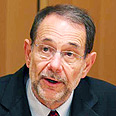
EU Foreign Policy Chief Javier Solana
צילום: גיל יוחנן
Solana says shocked by Israeli settlement growth
EU foreign policy chief urges Israel to freeze settlement construction, drop plans to finish security fence on occupied West Bank territory
EU foreign policy chief Javier Solana urged Israel on Sunday to freeze settlements on occupied West Bank territory and stop constructing the security barrier, saying they could obstruct lasting Arab-Israeli peace.
Solana said he was struck during a tour on Saturday of Arab towns on Jerusalem's eastern slopes that lie within West Bank land by the growth of settlements and a barrier cutting into land that Palestinians want for a state.
"I had the opportunity to make a tour along the eastern part of Jerusalem and go to Abu Dis and its surroundings. You get really very shocked every time you go and you see the situation worse, the wall is more extended and settlements are more extended," Solana told reporters in Amman.
Under the US-backed "road map" peace plan of 2003, Israel was supposed to halt settlement building in the West Bank, which Israel occupied in the 1967 Arab-Israel war. Palestinians were also required to dismantle militant groups, a step they have yet to take.
Some 260,000 settlers live in the West Bank, home to 2.5 million Palestinians.
"All these things have to first freeze and then to begin to see how they can be resolved in order to get the process moving again," Solana said.
'Window of opportunity'
Israel says the barrier, a mix of wire fencing and concrete walls, stops suicide bombers from reaching its cities.
Solana said he hoped "the realities on the ground" brought about by Jewish settlement building would not "prevent a two-state solution from happening."
The EU official said there was a "window of opportunity" that the international community and the parties to the conflict should seize to revive talks that collapsed in 2001 and have remained deadlocked since Hamas took power.
"We think there is an opportunity now, an opportunity that should not be let go by to open the political process that should end up with the resolution of the conflict," he said.
Solana said a new resolve was emerging among the Quartet of Middle East mediators -- the United States, United Nations, Russia and the European Union -- that raised hopes for progress when a planned meeting takes place in Washington on February 2.
"The political will is being constructed. It's been too long in which the suffering of people has been very deep ... and the moment we think has arrived to change the approach," he said.
Solana who has also visited Egypt and the Palestinian territories in his current Middle East tour left for Israel to meet Israeli Prime Minister Ehud Olmert before heading back to Brussels.










